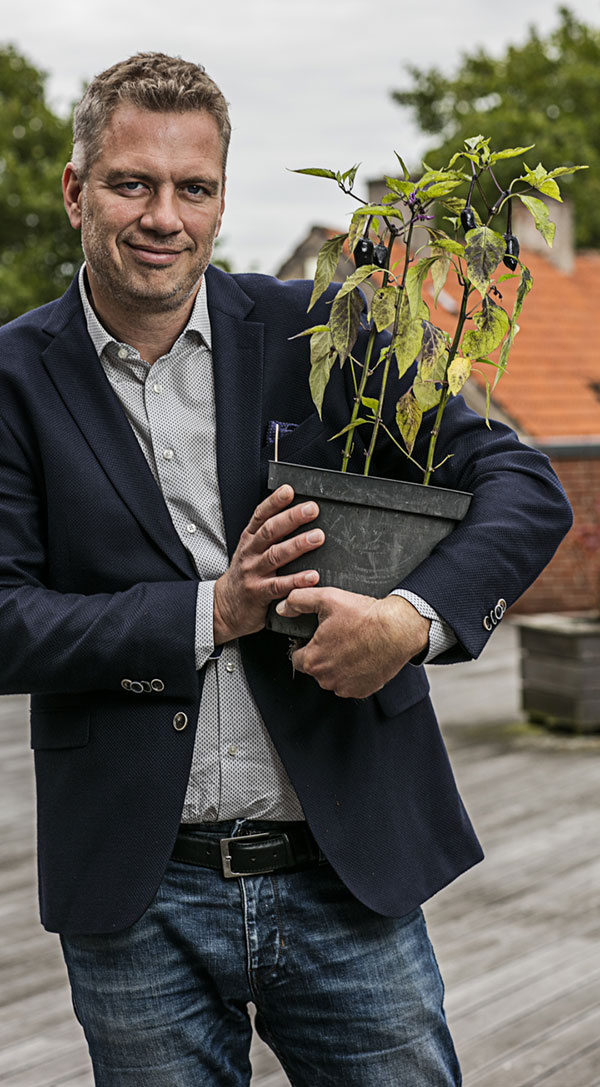
Sustainability – a hot word on everyone’s lips right now. People want it, clients demand it, brands lie about it, and very few actually embrace it. Sustainability is about each and every one of us, no exceptions, and about the world we live in. It should be common sense to try and make the world better – or at least reduce our harmful impact – yet there are so few things that are ‘common’ nowadays.
But what is sustainability, anyway? Is it a goal, a tool, an expense, a box that needs to be ticked so one can market successfully to the Gretas of the world? Well, in the words below, Michael argues that it’s not a destination, but a journey. Brands need to really embrace sustainability (at the core) and take whatever steps they can (big or small) towards it.
Our interviewee, Michael Stausholm, is the founder of Sprout World, the first and only company in the world that makes plantable pencils. It’s obvious that Michael’s efforts have sustainability written all over them, and his understanding of the concept is even more impressive than his brand. Here’s what he has to say:
Brandingmag: What is the meaning of sustainability for a brand?
Michael Stausholm: Sustainability is, first and foremost, not about cutting corners or taking the easy option. Actioning sustainability is about constantly taking a very hard look at your products or services, your raw materials, and your supply chain, and always evaluating whether, for example, you could change the place of production to one near the point of selling, or looking at how to replace a plastic part with one that uses natural resources.
It is also very much a matter of communication. Be clear, transparent, and specific. Never just say “This product is sustainable” – what does that even mean?
Bm: Can sustainability be more than a marketing/PR tool? Can it be core to a business?
MS: Sustainability should NEVER be just a marketing or PR tool. Consumers are becoming fatigued with sustainability claims and are increasingly suspicious of companies that use buzzwords such as eco-friendly, sustainable, organic, or bio-plastic, without any clear evidence to back it up.
It can and must be core to the business and be apparent in every department including sales, marketing, the supply chain, and even HR and finance, and companies are now realizing that. But it was not long ago when sustainability was driven by the single, poor, and lonely CSR manager who was struggling to make management listen and to implement change. What we see more of today is C-level management being the ones to drive change, with sustainability coming from the top-down rather than from the bottom-up. This means the chances of success in actioning sustainability are much higher.
Sustainability is no longer just nice to have, it is a need to have.
Bm: Is it possible for a sustainability-oriented business to build more brand equity than a product-oriented one?
MS: Yes, it is possible for a sustainability-orientated business to build more brand equity than a product-oriented one. Being product-oriented only no longer cuts it. As a company, you must be purpose-driven and focused on your brand. If you are only focused on selling products, you will always be competing on price only, which means you will forever be part of a race to the bottom where there are no winners.
Bm: What gradual steps can a brand take towards becoming sustainable? Can every brand hope to become 100% sustainable someday?
MS: Most companies think that sustainability is about being 100% sustainable from the beginning. Nothing could be more wrong. Sustainability is a journey, not a destination. But it is not about merely hoping to become 100% sustainable someday either – you must actually work towards that goal every single day.
You have to be constantly improving and be committed to the cause. If you set out to change the world, save the polar bears, and reduce your CO2 impact to zero without adequate time, you run the risk of becoming weary and you’ll lose enthusiasm along the way when you realize the goal was too big to achieve. Sustainability is about setting achievable goals so you can actually achieve them.
When we originally started Sprout, local production was (and still is) the main priority, but during the first 1-2 years, we only had production in the USA and had to ship to Europe from there, which was not very eco-friendly in terms of CO2. But we were transparent about this and about the fact that we were working towards setting up production in Europe to serve the European market. Today we have production on both continents to serve the respective regions.
Bm: Why do you think brands sometimes use sustainability as a means of audience manipulation, with false or misleading claims? Is the planet simply not important to some or is sustainability just not for everyone?
MS: Unfortunately, the misleading claims seem to stem from some brands trying to be too smart, too fast. Many marketers see sustainability as a trend that they need to talk into, rather than having a true understanding that it must be deeply rooted in the brand and that they must be able to prove such claims.
Brands need to understand that the younger generation, especially, demands action. Greta Thunberg speaks with so much passion that it can seemingly push a lot of people away, but brands need to understand that she nevertheless speaks on behalf of a whole generation that we cannot ignore.
The planet is important, and sustainability is an issue for everyone. Every single corporation can and must do something. Even the darkest of dark companies such as the big oil companies, can and are working towards more sustainable practices (i.e., investing in alternative energy such as wind), while car-makers (and not only Tesla) are investing heavily in electric cars. Sustainability is no longer just nice to have, it is a need to have.
Bm: How should offender brands be held accountable for their actions in a way that, in turn, benefits the environment? Last year, there were little to no consequences for H&M’s and Zara’s misleading sustainability claims.
 MS: The clothing and textile business is one of the worst offenders when it comes to sustainability.
MS: The clothing and textile business is one of the worst offenders when it comes to sustainability.
The likes of H&M and Zara’s fast-fashion business models of selling cheap and low-quality clothing, often from China or India, is by definition not sustainable or environmentally friendly.
The lack of transparency in this industry (but also in many others) is a huge problem for consumers. How do we know if a t-shirt is produced under ethical work conditions in Asia? And without the use of harsh chemicals. And what about the “organic cotton” they use, how does the production take place? We simply don’t know. We tend to think “Oh, it’s organic, then it must be good.”
Misleading consumers with vague marketing terms is a growing problem that we need to solve with more rules and regulations, to make transparency a priority. We as consumers should be able to, with a few clicks or a QR code, see the journey of a product from conception to the shelf.
If there was a standardized procedure that all brands needed to comply with and report upon, it would improve transparency significantly. And it would allow consumers to be able to make the right choices based upon real facts.
I think the reason why there is such a high volume of very cheap clothes being sold in wealthy countries is that we have given up on trying to find out what we actually pay for. It’s too complex as it is now. The real question is: Do we need a new collection from cheap clothing companies every 2 weeks? It used to be 2 collections every year – Spring/Summer and Autumn/Winter. That is much more sustainable.
Another way to solve the problem with misleading sustainability marketing is with clearer direction from a legal perspective. What is permitted and what is misleading? And then increase the fines if claims are found to be misleading.
Bm: How did you arrive at the conclusion that Sprout is something that the world needs right now? How much environmental good has it done so far and what influence did it have on public perception?
MS: I’ve always said that we can’t save the world with our plantable pencils, and of course, this is still true. However, what we CAN do is inspire people and companies to take more eco-friendly steps every day. We want to make them reflect: If we can plant a pencil stub after use instead of throwing it out, what else can we do to leave a positive impact?
Every day, 135 million plastic ballpoint pens are produced globally. That’s a huge amount of plastic! A lot of these plastic pens will end up in landfill because a plastic pen is a use-and-throw-away product. Imagine if we can replace a part of this plastic with plants.
So, far we’ve sold over 30 million plantable pencils – this means that there are potentially 30 million new plants out there growing from waste. And now, with our newly launched Planta-a-Tree edition pencil, we can even transform pencil stubs into trees!
Bm: You mentioned that Richard Branson, Coca-Cola, Toyota, and other high-profile brands use Sprout pencils to communicate their sustainable messages. Has any one of them offered to go a step further and partner up for more impact?
MS: Several of our high-profile customers place re-orders when they have started to use our products. They use them for all kinds of campaigns. In fact, our re-orders are over 70%.
Bm: If you were to start another sustainable brand, which one would it be and why?
MS: I would create a ground-breaking sustainable product that makes a great difference in people’s lives. One such product that comes to mind is a Danish invention called the LifeStraw, designed by Vestergaard. LifeStraw is a device that filters water and removes 99.9% of waterborne bacteria and parasites. It prevents diseases caused by contaminated drinking water in the third world such as Hepatitis E, Dysentery, and Typhoid Fever.
Bm: What is your most urgent message to every business that isn’t truthfully searching for sustainability?
MS: The average consumer is getting wearier of companies with fancy sustainable marketing messages. If your company doesn’t work on this in an honest and transparent manner, you will be called out, not only by consumers, but also the media, and especially on social media. Sustainability is a moving train and you need to join it in first class, or you will be left behind.